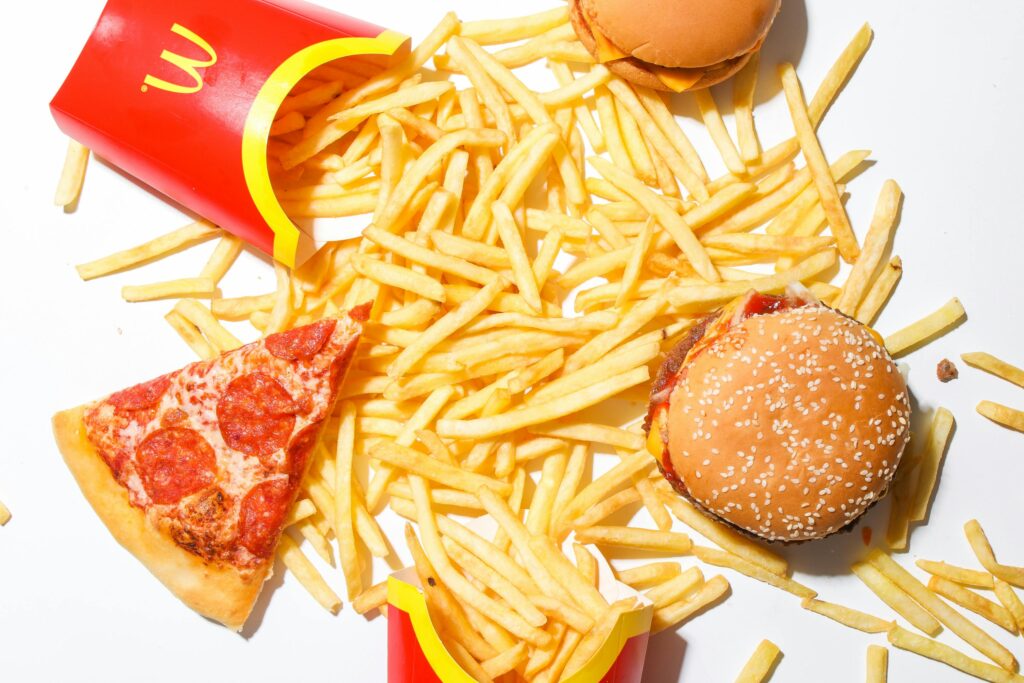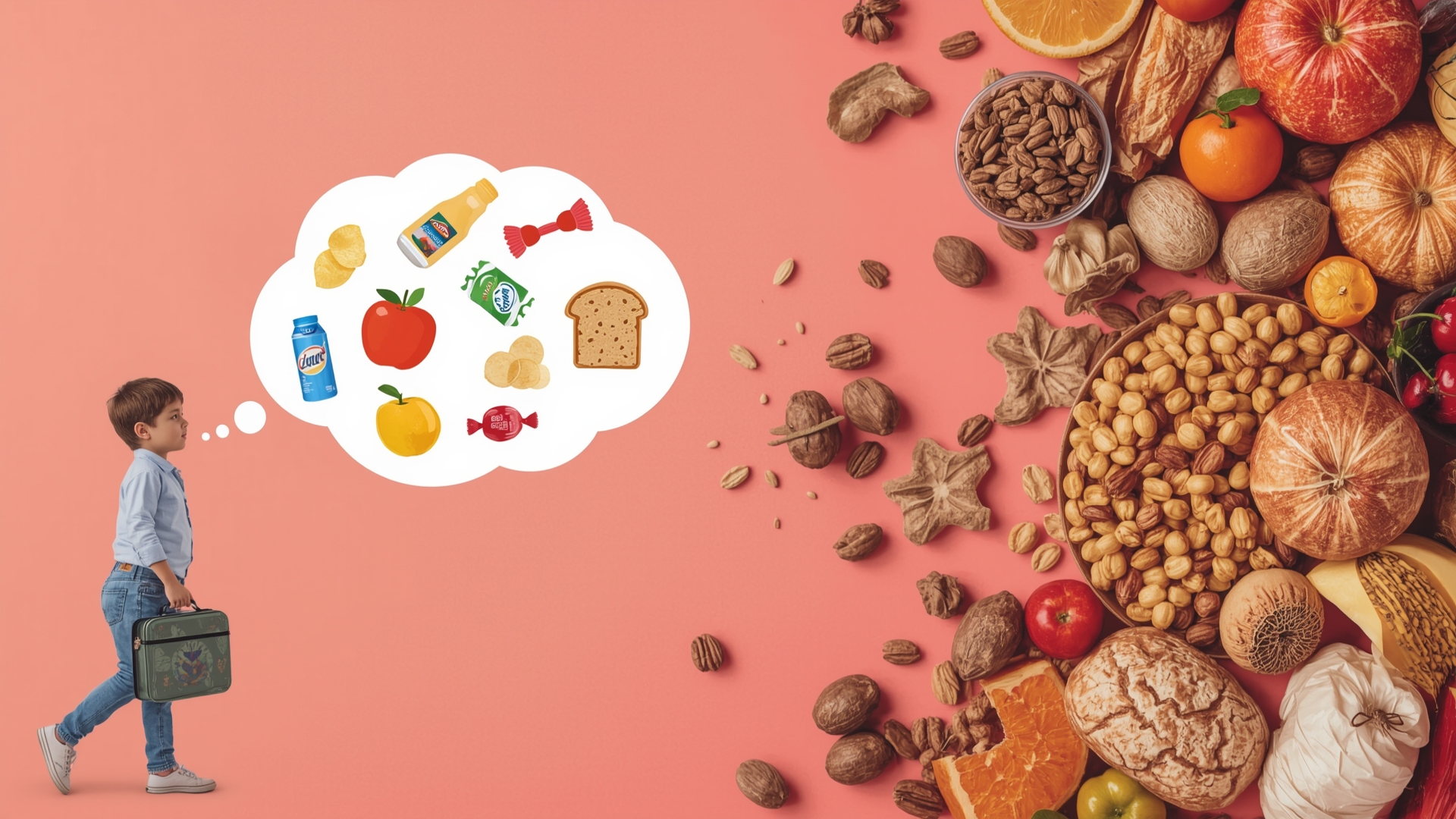Every parent wants their child to be sharp, focused, and full of healthy energy. However, some everyday foods might look innocent but can negatively impact brain health, memory, mood, and overall cognitive function. Instead of feeling guilty, it’s all about making informed choices. Small dietary changes can go a long way in supporting brain development.
Let’s explore five common culprits and their healthier alternatives to keep children’s minds thriving.
1. Too Much Refined Sugar – A Hidden Threat to Brain Health

Sugar may seem harmless, especially when kids love sweet treats. But excessive refined sugar—found in biscuits, chocolates, sugary cereals, and energy drinks—causes rapid energy spikes followed by crashes. This cycle impacts concentration, mood stability, and long-term brain health.
Over time, a high-sugar diet can lead to inflammation in the brain, impairing cognitive abilities. Studies show that excessive sugar consumption negatively affects memory and learning capacity in children.
Healthy Alternatives:
Instead of refined sugar, try natural sweeteners like jaggery, honey, dates, or homemade treats. These options provide sustained energy without harming brain function.
2. Packaged Juices & Sodas – Colorful Yet Harmful

Many parents believe store-bought juices are healthy, but in reality, they contain excess sugar, artificial colors, and preservatives. These additives can contribute to hyperactivity and reduce attention span.
Sodas and sugary drinks are even worse—they offer zero nutritional value while exposing young minds to harmful chemicals that can disrupt brain function.
Healthy Alternatives:
Instead of processed juices, opt for whole fruits, homemade smoothies, or fresh lemonade. You can make them fun by serving them in creative shapes or playful cups to encourage healthy drinking habits.
3. White Bread & Processed Carbs – A Memory Disruptor

White bread, pasta, and other refined carbohydrates convert to sugar rapidly, causing energy fluctuations that affect memory, focus, and learning abilities. These foods lack fiber and essential nutrients needed for brain function.
Long-term consumption of processed carbs can increase the risk of brain fog, mood swings, and difficulty retaining information.
Healthy Alternatives:
Instead of white bread, try whole wheat, millet, or multigrain alternatives. These provide slow-releasing energy, keeping children focused and alert throughout the day.
4. Excess Salt in Snacks – A Sneaky Brain Health Hazard

Salty chips, instant noodles, and processed snacks contain excessive sodium, which reduces blood flow to the brain and negatively impacts cognitive function. Over time, High salt intake can contribute to learning difficulties and reduced mental sharpness.
Kids love crunchy snacks, so the challenge is to offer healthier options without sacrificing taste.
Healthy Alternatives:
Swap processed salty foods with unsalted nuts, baked sweet potato chips, or air-popped popcorn. These provide the same satisfying crunch while supporting overall brain health.
5. Artificial Flavors & Preservatives – A Risk to Cognitive Development

Ready-made meals, packaged candies, and processed snacks contain preservatives linked to behavioral issues, poor concentration, and hyperactivity. Some additives can also disrupt neurotransmitters responsible for learning and emotional stability.
Children are naturally drawn to colorful and fun-looking snacks, but not all bright foods are safe for brain health.
Healthy Alternatives:
Encourage kids to eat fresh, natural foods instead of processed ones. Making snacks at home allows parents to control ingredients and eliminate harmful preservatives.
Final Thoughts: Small Changes Make a Big Impact
Supporting children’s brain health begins with mindful eating habits. By swapping harmful foods with brain-friendly alternatives, parents can improve cognitive function, focus, and emotional well-being in their kids.
Making these dietary shifts isn’t complicated—it’s about awareness and simple swaps that add up over time. Start today, and give your child the best possible foundation for a sharp, focused mind!
Brain Health FAQs: Protecting Children’s Cognitive Development
How does excessive sugar consumption affect my child’s brain health?
Excessive refined sugar causes rapid energy spikes followed by crashes, which impacts concentration and mood stability. Over time, high sugar intake leads to brain inflammation that impairs cognitive abilities, memory, and learning capacity. The energy fluctuations from sugar make it difficult for children to maintain focus throughout the day.
Are store-bought fruit juices really that harmful for children?
Yes, most packaged juices contain excess sugar, artificial colors, and preservatives that can contribute to hyperactivity and reduce attention span. Despite appearing healthy, these drinks offer little nutritional value while exposing children to harmful chemicals that disrupt brain function. Fresh whole fruits or homemade smoothies are much better alternatives.
Why are white bread and processed carbs considered bad for brain development?
White bread and refined carbohydrates convert to sugar rapidly in the body, causing energy fluctuations that affect memory, focus, and learning abilities. These foods lack the fiber and essential nutrients needed for proper brain function. Long-term consumption can lead to brain fog, mood swings, and difficulty retaining information.
How do salty snacks impact my child’s cognitive abilities?
Excessive sodium from chips, instant noodles, and processed snacks reduces blood flow to the brain, negatively impacting cognitive function. High salt intake over time can contribute to learning difficulties and reduced mental sharpness. The reduced blood flow means the brain doesn’t receive optimal oxygen and nutrients needed for peak performance.
What specific problems do artificial flavors and preservatives cause in children?
Artificial additives found in ready-made meals, packaged candies, and processed snacks are linked to behavioral issues, poor concentration, and hyperactivity. Some preservatives can disrupt neurotransmitters responsible for learning and emotional stability, making it harder for children to focus in school and regulate their emotions effectively.


1 thought on “Brain Health: 5 Shocking Everyday Foods That Could Be Silently Harming Children’s Cognitive Development”